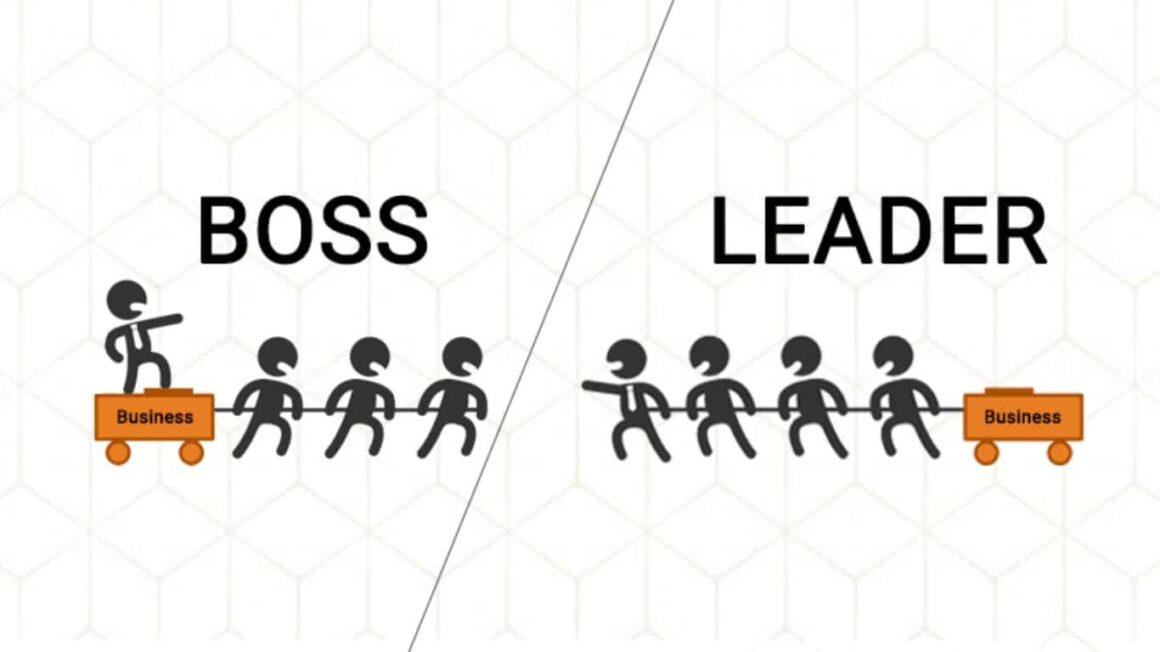The Difference Between a Boss and a Leader: A boss and a leader may seem like they are synonyms, but there exist many subtle and sometimes not-so-subtle differences between the both. The differences are evident in the way they conduct themselves and treat the people working for them. These approaches can be adopted separately to achieve different results. We will be looking at what sets a leader apart from a boss.
The Difference Between a Boss and a Leader
Communication
Communication is detrimental to the workings of a good professional relationship. How a person in authority communicates with their subordinates sets the tone of the relationship.
A leader is more open to communication. They tend to treat their subordinates almost as their equals and are very respectful of their opinions and inputs. Rather than taking on an authoritative approach, they embrace a freer and open approach. Anyone would find it effortless to approach their leaders with any ideas or doubts they might be harbouring. This approach creates a very conducive environment for people to grow in and helps them achieve better results.
A boss, on the other hand, has a more rigid style of communication. They tend to keep their interactions with their subordinates short and to the point. They often dictate the way a job should be done and expect their subordinates to follow these orders. There is rarely, if at all, a two-way conversation. Hence, there is not much possibility of cultivating creativity for their subordinates.

Inspiration
Inspiration is an important aspect of the personality development of a person. Being inspired by someone lets people have a framework of who they would like to become in the future.
A leader aims to be an inspiration to their followers. Their work ethic, ideologies and behaviour towards people is so incredible, that people find themselves to be inspired by them every step of the way. A leader provides people with the necessary skills needed to thrive in their specific field. People generally tend to gravitate towards leaders and their strong personalities, which they are inspired to emulate in order to become successful.
Whereas, a boss dictates how the behaviour and work of their subordinates should be. Rather than giving them the tools needed to succeed with a specific task and allowing them to find their own way around it, a boss lays down specific instructions which must be carried out as they are. It is definitely more challenging to learn under a boss than it would be under a leader.
Critique
Critique is a crucial tool for a person to grow and improve their work. Without critique, it would be impossible to find ways to make your work even more refined. However, the way in which a critique is delivered is also a huge determinant of the effects it could have on the work.

A leader always ensures they provide their subordinates with a constructive critique. Their goal is not to discourage their subordinates, but rather to inspire them into putting more effort and correcting their mistakes in order to achieve better results. This supportive attitude makes it easier to rectify any mistakes that may have been made with ease.
A boss would not be as kind about delivering critique as a leader. For a leader, both the improvement of the work, as well as their subordinate, is the goal. However, a boss is only concerned with the finished product that is to be delivered in front of them. It creates a stifling environment and people find it difficult to grow within it.
Accountability
Accountability is an important virtue to possess. Making mistakes is a part of the human experience, what is important is to admit it and find a way to fix those mistakes.
A leader strives to set a good example for their subordinates. That is why a leader is always quick to admit accountability whenever he makes a mistake. It is a sign of a good leader to not blame others for their own mistakes and find a fix for them. This helps their subordinates realize that making mistakes is a part of the learning process and does not need to feel like the end of the world.
A boss seldom admits to their own faults. They more often than not tend to blame other people for their mistakes. Just as they fail to take accountability, they also fail to offer forgiveness to their subordinates. This creates a hostile environment and is difficult to grow in.

Teamwork
Teamwork is the most important ingredient in the recipe for success. If there is no cohesive teamwork, it is difficult, or even impossible to achieve the desired goals.
A leader always works as a part of the team. If the team is a well-oiled machine, the leader is just another gear within it, along with their subordinates. All the parts are just as important to ensure proper working. The coordination between the leader and their followers is what helps achieve unimaginable results. A leader acts like the glue and is aware and mindful of his responsibility of keeping the team together.
A boss often sees himself apart from the team. If we compare the team to a well-oiled machine again, the boss is an operator rather than a gear. They do not work with their subordinates but delegate the work and keep a watchful eye on the workings. According to a boss, cohesiveness between team members does not take much priority. Above all, a boss cares most about getting the task done and is not particularly worried about the process behind it.
Evidently, while being a boss or a leader might be believed to be the same thing, there exist many differences that set them apart from each other. Right from the approach taken with the subordinates to the work ethic, there exist differences between a boss and a leader in every avenue imaginable. For some, the boss approach may work better, while some may prefer the leader approach. It is necessary to understand what both of those entail before committing to either.
Also Read: 5 Books to Improve the Way You Communicate with Others




